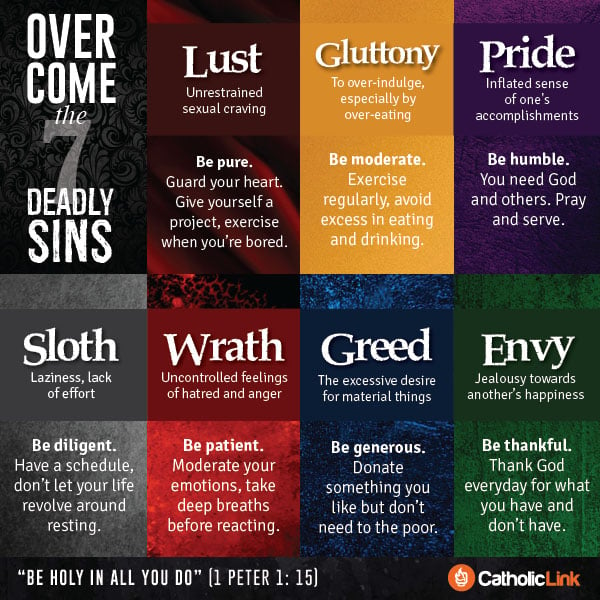The virtue of charity is our union with God. The Council of Trent declared that we maintain the virtues of faith and hope after we commit a mortal sin, both of which encourage us to seek out the sacrament of confession. But the Catechism of the Council of Trent explains that “whoever offends God, even by one mortal sin, instantly forfeits whatever merits he may have previously acquired through the sufferings and death of Christ, and is entirely shut out from the gates of heaven.”
Just one unconfessed mortal sin is sufficient for damnation and eternal hellfire. This is because we have broken our relationship with God through charity. Thus, we should clarify the three stipulations required in order to meet the criteria for a sin to be mortal.
3 Stipulations For Mortal Sin
1. Serious or grave matter. This often means that the action is clearly evil or severely disordered. This would include many common activities: looking at evil images, contraception, intentionally missing Mass, recreational drug use, etc.
2. Sufficient knowledge or reflection. This means we know we are committing a sinful act and that we have had sufficient reflection for it to be intentional. Some may tell you that the knowledge portion renders most sins less serious than a mortal sin because most people do not have a knowledge of the Faith. It is worth noting that knowledge does not mean understanding. Furthermore, nowhere in any dogmatic teaching or Scripture does it say that we must have specific theological knowledge in order to commit mortal sin. Everyone is born with a sense of the natural law, meaning that an understanding of morality, even if imperfect, is built into our nature. St. Paul says, “All have sinned, and do need the glory of God, being justified freely by his grace, through the redemption, that is in Christ Je sus” (Rom. 3:23–24).
3. Full consent of the will. This means that we must freely choose to commit a grave sin in order for it to be a mortal sin. If there is any significant impediment to our will, then it is possible that the sin is not mortal but only venial (venial sins are less serious sins).
“To be silent when we are impelled to utter words injurious to God or to our neighbour, is an act of virtue; but to be silent in confessing our sins is the ruin of the soul.”
—St. Alphonsus
How to Distinguish Mortal and Venial Sins
It is true that at times we may not be certain if we have met the three necessary criteria. In this case, I would err on the side of caution and confess the sin. In fact, even venial sins should be confessed in order to gain graces to stop committing any sin at all.
For example, I work with many other people, which means I need to be on guard against gossip and harmful backbiting. There have been times where I have at least passively participated in conversations that were rife with gossip. If I actively participated with the intent of denigrating someone’s character, then I could have committed the mortal sin of detraction—seeking to destroy a reputation.
On the other hand, if I passively tolerated the insults and gossip, then I would be committing a venial sin rather than a mortal sin. This is because I didn’t fully participate in the sinful activity, but I failed to act virtuously. In this case, I would bring this to confession in order to obtain the graces to stop participating in gossip altogether. This is a little known fact about the sacrament: confession not only cleanses mortal sin but also gives grace to overcome sin in the future.
It is possible for a sin to be mortal in one circumstance and venial in another. It should be noted, however, that, as already stated from the Catechism of the Council of Trent, only one mortal sin is necessary for us to forfeit heaven.
Most of our sins are not mortal, but virtually all people commit at least one mortal sin, if not more, throughout their life. Do not hedge your bets, and move swiftly to the sacrament of confession if you have any doubts. God will be pleased with your fervor for holiness, and you will grow closer to him through your efforts. Only be careful to guard yourself against the vice of scrupulosity.
Everyone has sinned (excluding Our Lord and Our Lady), and everyone is in need of redemption. The crucifixion of Our Lord Jesus Christ was for you as much as for anyone who has ever lived. There are some saints who have lived lives free of mortal sin, like St. Thérèse de Lisieux, but this is the exception. Do not count yourself among the exceptions. Ironically, the greatest saints who lived free of mortal sin viewed themselves as wretched sinners. Their humility propelled them to always rely on God’s mercy in the confessional.
St. Dominic Savio, a young pupil of St. John Bosco, died as a young boy who seems to have never committed a mortal sin. He had a motto: Death before sin! Adopt this motto, make it your own, and repeat it to yourself when tempted by the devil.
This is article is an excerpt from Terror of Demons: Reclaiming Traditional Catholic Masculinity. To continue reading, purchase your copy here.




















